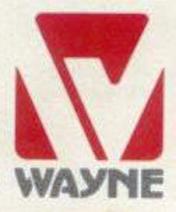Wayne Corporation
 |
|
| Private | |
| Industry | Transportation |
| Fate | Defunct (Bankruptcy) |
| Predecessor | Wayne Works |
| Successor | Wayne Wheeled Vehicles |
| Founded | 1837 Union City, Indiana, United States |
| Defunct | 1995 |
| Headquarters | Richmond, Indiana, United States |
|
Area served
|
North America |
| Products |
Buses Second-stage manufacturer |
| Parent |
Divco Corporation (1957–1968) Indian Head (1968–1975) Thyssen-Bornemisza (1975–1984) |
| Subsidiaries | Welles Corporation (1925–1990) Miller-Meteor (1956–1979) Cotner-Bevington (1964–1980) |
Buses
Second-stage manufacturer
Wayne Corporation was a manufacturer of buses and other vehicles branded with the trade name "Wayne." The corporate headquarters were in Richmond, Indiana, in Wayne County, Indiana, in the United States. Wayne became a leading producer of school buses in North America.
Among innovations Wayne introduced were the first school bus application of the now popular cutaway van chassis and the first large school bus bodies featuring continuous longitudinal panels to reduce joints and improve structural integrity a number of years before FMVSS standards were required for all US school buses. After 1980, Wayne faced difficulty competing in a market with overcapacity. Declaring bankruptcy, the company discontinued operations in 1992 and the assets were liquidated.
Wayne is a name in school transportation that predates the familiar yellow school bus seen all over the United States and Canada. Beginning in the 19th century, craftsmen in Richmond, Indiana at Wayne Works and its successors built horse-drawn vehicles, including kid hacks, evolving into automobiles and virtually all types of bus bodies during the 20th century. Wayne products eventually included school buses, transit buses, highway coaches, military and shuttle buses, ambulances and even huge bus bodies pulled by tractor trailers used to haul oil field workers in the Middle East.
Among many innovations, Wayne pioneered the guard rails on the sides of all school buses today, inboard wheelchair lifts, and even high-headroom doors (a special accommodation for mobility-challenged persons requiring head and neck support from above). The company was the first with a school bus based upon a cutaway van chassis, the Wayne Busette, a chassis design which more than 35 years later remains one of the most popular in use in North American markets. The crowning safety achievement was the Wayne Lifeguard structural design introduced in 1973, which featured continuous interior and exterior longitudinal panels. The Lifeguard's design helped pave the way for the all-important U.S. Federal Motor Vehicle Safety Standards (FMVSS) for school buses, most of which became applicable on April 1, 1977. In the years after, Wayne continued to be a leader in bus safety engineering.
...
Wikipedia
